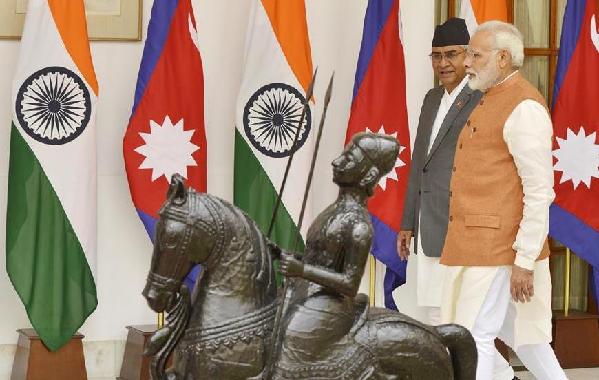India continues to meddle in Nepal's politics
- By Ritu Raj Subedi
 0 Comment(s)
0 Comment(s) Print
Print E-mail China.org.cn, November 26, 2017
E-mail China.org.cn, November 26, 2017
In his recent book entitled "How India Sees the World," former Indian Foreign Secretary Shyam Sharan admitted India’s interventionist policy towards Nepal had always been counterproductive.
|
|
|
Indian Prime Minister Narendra Modi (R) and visiting Nepalese counterpart Sher Bahadur Deuba walk towards the meeting room at Hyderabad House in New Delhi, Aug. 24, 2017. [Photo/Xinhua] |
According to him, India interfered in Nepalese domestic affairs fearful of losing its influence, but its actions of applying "friend" and "foe" labels to various leading figures had made things worse.
Shyam Sharan, who served as an Indian ambassador to Nepal when the Maoist insurgency was at its heights, also played his role in signing a 12-point understanding between the CPN-Maoist group and parliamentary parties. His admission of India’s flawed foreign policy gives an impression the country is going to rectify its attitude on Nepal, but that is not the case.
India continues to be frantically involved in Nepal’s internal affairs, especially after the two big communist parties, the CPN-UML and the CPN-Maoist Center, formed an electoral alliance under the banner of the "Left Alliance," with a complete merger to follow the vote.
The Indian Embassy in Kathmandu became active to form a Loktantrik Alliance involving the ruling Nepali Congress and Madhesh-based parties (representing ethnic groups in the Eastern Terai region linked to India) to counter the Left Alliance.
However, its all-out efforts to get the Madhesh-based parties and the Nepali Congress on board went astray. The former demanded the lion’s share of electoral seats in the upcoming federal and provincial poll, which the N.C.rejected.
Sources claimed that the chief of the Indian intelligence section at the embassy made his last-ditch effort to iron out differences between the two groups over the sharing of electoral seats in Province No. 2 bordering India.
As the proposed electoral alliance failed to materialize, Indian ambassador Manjim Singh Puri went to Janakpur in central Terai reportedly to generate support for the N.C. candidate Bimalendra Nidhi who is facing the Rastriya Jatana Party-Nepal’s leader Rajendra Mahato in a tight constituency race. Puri met local businessmen and intellectuals and pledged construction of a "Ramayan Circuit" to promote religious tourism.
India is already pleased with the N.C.’s election manifesto and candidate selection. The manifesto did not use the term "Indian embargo," only describing it as "obstruction on the southern border." Moreover, N.C. members defying the Indian blockade have been deprived of election tickets, while those support the Indian blockade have had their candidacies accepted.
Examples of this are leading N.C. members Gururaj Ghimire, Dhanaraj Gurung, Jiwan Pariyar and Badri Pandey all failing to be selected for their anti-Indian stance.
Meanwhile, N.C. officials like Nidhi, Minendra Rijal, Deep Kumar Upadhyay, Amresh Kumar Singh, Farmullah Mansoor and Pradeep Giri were awarded the tickets after coming out in favor of the Indian embargo.
Former speaker Daman Nath Dhungana, who has not been in active politics for over a decade, was also favored after he went to border to support the Madhesh parties in obstructing the supplies of fuel and food from India. Dhungana had also defended CK Raut, who had openly promoted a secessionist campaign in the Terai.
In its manifesto, the N.C. promised to amend the statutes to meet Madhesh demands for more autonomy, widely viewed as part of the Indian agenda to keep Nepal under "controlled instability."
In the latest episode, the N.C.-led government scrapped an agreement on the construction of the Budhigandani hydropower project with a Chinese company, claiming procedural lapses in the signing.
China’s Gezhouba Group was awarded the contract to build the 1,200mW power project at a cost of 260 billion Nepali rupees. It was considered an important project to be carried out in Nepal under the Belt and Road Initiative.
The opposition CPN-UML denounced the decision to scrap the deal as illegal, arguing that the caretaker government had no right to make decisions having such a long-term impact.
It was widely believed the government had acted under the Indian pressure. The decision came at a time when the government had already allocated money to acquire land for the project.
Experts fear the decision risks losing Chinese investment that Nepal badly needs to build infrastructure and create jobs.
Meanwhile, the Nepal government has once again extended the deadline for the two Indian companies to achieve financial closure on the Arun III Hydropower Project and Upper Karnali Hydropower Project to ingratiate itself with India.
Ritu Raj Subedi is an associate editor of The Rising Nepal.
Opinion articles reflect the views of their authors, not necessarily those of China.org.cn.







Go to Forum >>0 Comment(s)